I had never heard about Armistice Day (also known as Remembrance Day) until very recently when my old time friend Isadora came back from Cambridge UK, where she lived for a year and brought me a poppy flower as a souvenir from England.
Except this was no ordinary souvenir, when she started telling me the story behind it, it actually had a lot of meaning.
I think it is very important for travelers planning a trip to get to know about such special dates in the calendar when they’re visiting a new place, so that they can get in tune with the atmosphere, learn, act in an appropriate manner and bring home some of the spirit and teachings from the culture they visited.
Armistice Day, the fallen in war
The poppy flower is the adopted symbol that commemorates the soldiers fallen in war during WWI, WWII and the subsequent armed conflicts.
It seems that the poppies have been linked to peace times after war since the time of the Napoleonic Wars. It is said that a writer visiting the graves of soldiers saw the poppies growing over them.
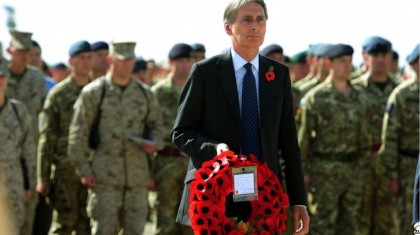
Defence Secretary Philip Hammond joined British troops at Camp Bastion, who fell silent at 11:00 local time (06:30 GMT). He said the recent deaths of soldiers in Afghanistan served to underline the importance of the act of remembrance. Photo: BBC.
In 1915 Canadian physician and Lieutenant Colonel John McCrae wrote the poem “In Flanders Fields” when he saw the poppies growing next to a grave of a fellow soldier.
In Flanders fields the poppies blow
Between the crosses, row on row,
That mark our place; and in the sky
The larks, still bravely singing, fly
Scarce heard amid the guns below.
The poem inspired France, Canada, the U.S, the United Kingdom and the Commonwealth countries to adopt the poppy as the Flower of Remembrance.
The 11th hour of the 11th day of the 11th month
Yesterday was November 11th, 2011, which was particularly curious and seemed to add to the solemnity of the day. Here’s what the BBC recorded as the different Armistice Day events in the UK.
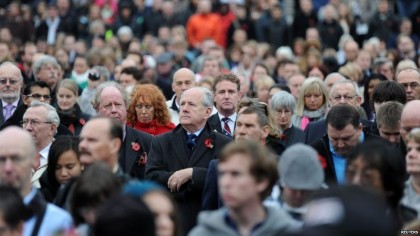
Crowd in Trafalgar Square during Armistice Day. Photo: BBC.
Back in 1918, at 5 am the armistice was signed between the Allies of World War I and Germany at Compiègne, France, for the cessation of hostilities of World War I.
Even though the armistice was signed at 5 am, it took effect at 11 am that day, adding up more casualties including more than 3200 Americans, Canadians and French soldiers among others.
WWI was one of the most horrifying armed conflicts in history because it differed so much from the usual war practices in use until the 19th century. Wars were fought at close range, with swords, spears and honor.
In World War I, we had machine guns, grenades and long reach weaponry that allowed for the systematization of death, bringing a whole new dimension of horror to armed conflicts.
WWI was devastating also because it paved the way for World War II, just 20 years later, some historians see both wars as one, with a brief “peace” period in between.
Lest We Forget
If you don’t know about this very special event and you happen to be vising the UK in the previous days, you’ll see people wearing the poppies on their clothes and shops and cars decorated with these flowers and the slogan Lest We Forget.
On November 11th every year, at 11 am, people flood the streets and take a two-minute moment of silence as a sign of respect for the 20 million soldiers who died in the war.
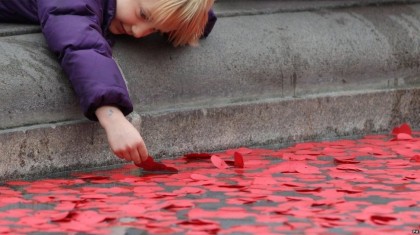
People paying their respects at Trafalgar Square placed poppies in the famous fountains. Photo: BBC.
Veterans from the different veterans associations in their countries receive donations on that day that go to help other veterans buy food, shelter and medical supplies. You receive a paper poppy in exchange for your donation.
And even if people are not out on the streets, wherever they are people pause, stop their machines, gather together and hold those two minutes of silence. After all, there were soldiers in almost every family in the UK.
The ceremony at Trafalgar Square in London is quite impressive and the Big Ben and its tolling bells bring an air of respect and somberness as can be seen in the link above of the BBC.
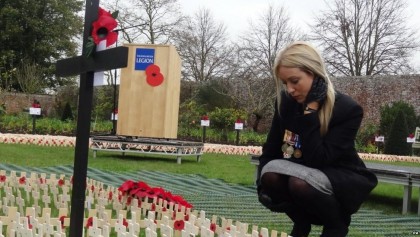
Kirianne Curley, the widow of Corporal Stephen Curley – who was killed in Afghanistan – placed a cross for him at the Royal British Legion’s Field of Remembrance in Royal Wootton Bassett. Photo: BBC.
It is much more than a patriotic display, it is a call to remember those who fought bravely, who died, who got maimed. The importance of such ceremonies in the culture and its people is not to be underestimated. The feeling in the air is of outmost respect and reverence.
I personally think that events such as these are vital in our understanding of the world around us and the education of the future generations. As I mentioned in my recent post about the Holocaust Memorial Museum in Washington, we must not forget.
The lessons in history are there so that we learn and become compassionate toward our fellow human. The thirst for power and our larger than life ego are always behind us inflicting pain on others. As with that post, allow me to invite you to remember and to cultivate tolerance and understanding of our differences that should not separate us, but bring us together in celebration!
Have you even been to the UK during Armistice Day?
What was your experience? What did the air feel like, what was the atmosphere?
Do you know of similar events in other areas of the world?
Share your comments in the field below and share this post using the buttons after this post!
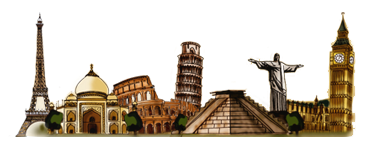


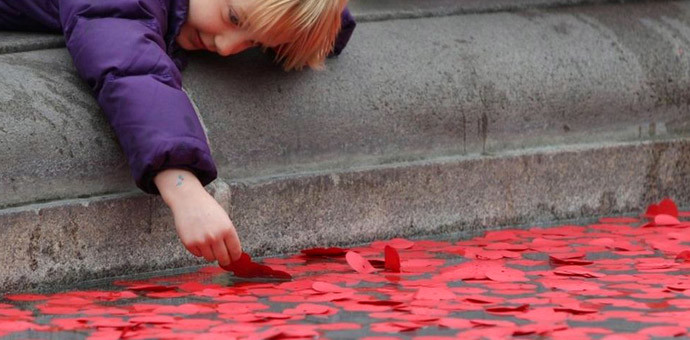


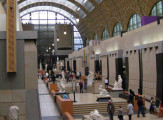
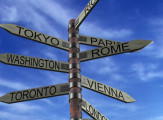

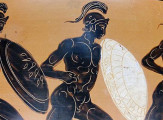

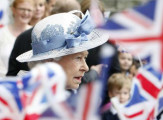
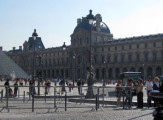

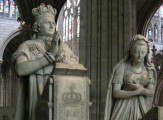


















[…] remember my friend Isadora from my posts 4 fascinating facts about Cambodia and Armistice Day: Poppies all over England. She spent three years working, living and exploring several areas in Southeast […]